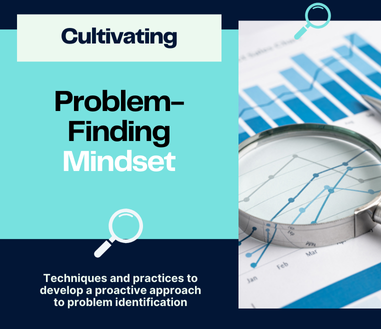In a corporate landscape where innovation is not just a buzzword but a survival tactic, leaders must cultivate a problem-finding mindset. This approach goes beyond recognizing the visible; it is about probing the depths for the concealed challenges that, when solved, propel a company forward. This article delves into how businesses can harness the power of ‘unknown knowns’—the hidden challenges and opportunities—to spark innovation and drive continuous improvement.
Understanding Cognitive Biases
Our decision-making processes are often subconsciously influenced by cognitive biases, those mental shortcuts we take to make complex problem-solving more manageable. Among these, confirmation bias leads us to favor information that aligns with our existing beliefs, anchoring bias causes us to give too much weight to the first information we receive, and status quo bias makes us prefer current circumstances over change.

Recognizing these biases is the first step in overcoming them and embracing a mindset that seeks out dissenting viewpoints and challenges the norm.
Encouraging Intellectual Curiosity
To truly unlock the potential within, organizations must promote intellectual curiosity. A growth mindset, the belief that abilities and intelligence can be developed, is fundamental. Encouraging employees to engage in purposeful listening and to ask open-ended questions fosters an environment where innovation can thrive. When a sales team exceeds targets, for instance, an inquisitive leader doesn’t rest on laurels but digs deeper—could customer surveys reveal unmet needs leading to product improvements or service expansions?
Building a Skill Set for Innovation
Critical thinking and creative exploration are vital components of a problem-finder’s toolbox. Analyzing information objectively, breaking down complex problems, and considering various solutions’ cause-and-effect relationships help in recognizing not-so-obvious opportunities. Techniques like mind-mapping can broaden the scope of potential solutions, and actively observing customer behavior can provide invaluable insights into improving services or product offerings.
Illustrative Success Stories
Consider Airbnb, which turned the hospitality industry on its head by recognizing that people had underutilized resources—spare rooms—that could be monetized, challenging the industry’s norms. Or Netflix, which foresaw the limitations of brick-and-mortar rental stores and tapped into the desire for convenient, on-demand entertainment, revolutionizing how we consume media.
Conclusion
In conclusion, mastering the art of problem-finding is akin to a treasure hunt within the corporate domain. It requires diligence, curiosity, and an unwavering willingness to challenge the status quo. Companies like Khan Academy have demonstrated that even well-established sectors like education can be disrupted and improved through innovative problem-finding. By acknowledging and leveraging the ‘unknown knowns’, companies can not only resolve existing issues but also preemptively address potential challenges, positioning themselves as leaders in a future where change is the only constant.
With a problem-finding mindset, organizations can cultivate a culture that thrives on continuous learning and embraces challenges as opportunities for growth and improvement. The first step is to look within, to the wealth of data and experience already at their disposal, and to set forth on the path of discovery and innovation.
About the Author
Vasudevan Kidambi, known as the “LAST-MILE MAN,” is a distinguished corporate expert with over 30 years of experience in operations and consultancy. As Managing Director of Navo Informatica Pvt. Ltd and Navo Management Consultants, he’s a pioneer in integrating Generative AI into business strategies, enhancing efficiency and innovation. Vasudevan’s unique approach includes his advocacy for One-Page Communication and extensive use of AI in content development and business applications.
His debut book, “One Page Communicator,” swiftly ascended to Amazon’s #1 bestseller spot within days of its launch and subsequently clinched the Golden Book of the Year Award for 2024.
Additionally, as Director of Business Transformation at Zenesis Corporation, Dubai, he continues to drive change. He’s also an educator and thought leader in AI, conducting boot camps and webinars to simplify AI tool usage for professionals.
His expertise in design thinking, data storytelling, digital workflow automation, and cognitive bots is transforming businesses globally, cementing his status as a holistic consultant in the digital era.


